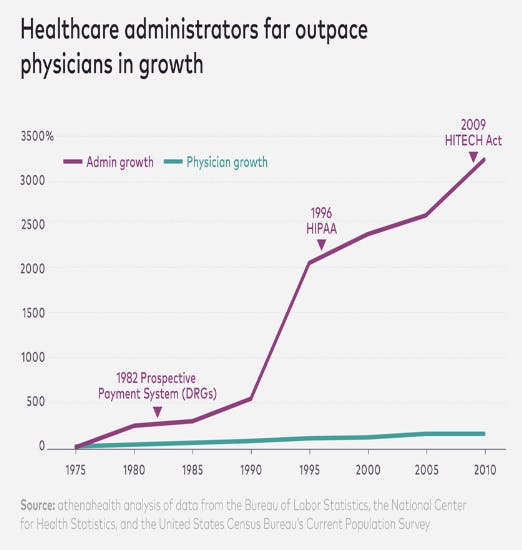
Health · December 18, 2024
Reduce admin. Improve care.
We’ve all heard it — more clinicians are needed in just about every healthcare category.
Yes, this is true, but we can’t ignore the administrative burden placed on the existing practitioners.
Nothing will have a greater impact on clinical shortages than a significant reduction in the time spent on administrative tasks.
You may have seen the data. The numbers are staggering. The TLDR: We spend too much time and money on administrative work in healthcare. The spending on administrative work in the US is growing faster and double that of comparable countries. WTF?!
Brace yourselves for some mind-boggling numbers. McKinsey dropped a study showing that 2019 we burned through a whopping $950 billion on healthcare admin costs. And get this - just five areas gobbled up 94% of that cash.

Source: McKinsey
We're talking about 25-33% of all U.S. healthcare spending going to paperwork and bureaucracy. Spoiler alert: that's way more than what's actually needed to, you know, provide decent healthcare. A paper trail to nowhere!
From 1975 to 2010, U.S. physician numbers grew 150%, matching population growth, while healthcare administrators increased 3200%, vastly outpacing physician growth. That is insane!

Source: Athena Health
So, what's the result of this admin work?
For our beloved clinicians, it's a perfect storm of paperwork fatigue, never-ending to-do lists, and documentation that's about as fun as watching paint dry. And if you're running a clinic? Congrats; your economics have only worsened. Even you rockstar admins are getting your slice of pie nibbled by the laborious paperwork.
Now, how do we escape this problem?
Spoiler alert: we can innovate to dramatically reduce the administrative burden on patients, providers, and payers.
That's why we're building Indie and writing the RTS newsletter—to shine a spotlight on the incredible, innovative work happening in rehab therapy and beyond. Think of RTS as your personal innovation cheat sheet.
Successful organizations prioritize administrative simplification as a strategic initiative, commit to transformational change, engage partners for the right capabilities, and allocate resources to key productivity drivers.
As highlighted by PT clinic manager Matt Mastenbrook, "Using AI-powered technology can ease the burden of what we do so we can better focus on the patients. At a time when clinicians need to extend their reach as much as possible, the ability to augment and enhance care delivery is immensely important and valuable."
This is about supercharging the best clinicians, administrators, and payers with the best possible technology so you can do more, make more money, and improve outcomes.